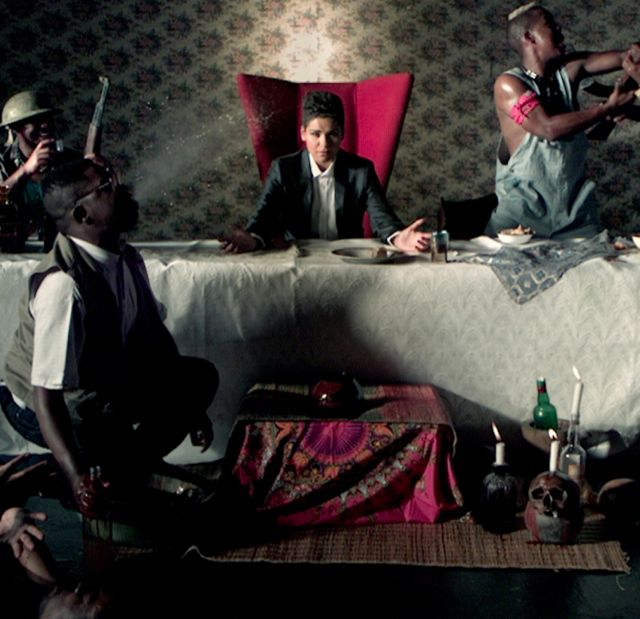C& is media partner of the major show “The Divine Comedy: Heaven, Hell, Purgatory revisited by Contemporary African Artists” at the MMK Museum für Moderne Kunst. As part of the show, C& will feature a series of exclusive conversations with the participating artists. Kudzanai Chiurai has been nominated for this years Future Art Prize.

Kudzanai Chiurai, Iyeza, 2012, Film still, Courtesy of the artist and the Goodman Gallery
MMK/C&: The exhibition’s point of departure is Dante‘s “Divine Comedy”. In the run-up to the exhibition, how relevant was it for you to actually engage with Dante’s work?
Kudzanai Chiurai: The work that’s part of the exhibition was not commissioned. So I never got a chance to engage with the book.
MMK/C&: In its merging of Christian beliefs and moral values as well as classical pagan topics, the “Divine Comedy” represents a deeply-rooted Eurocentric concept of society, values and culture. The exhibition aims at dismantling the European prerogative of interpretation and looking at it from a new angle. To what extent do you think this approach can lead to the Eurocentric interpretational sovereignty being generally put into question?
KC: The exhibition is a dissenting view on Eurocentric interpretational sovereignty. It opposes the exclusion of African characters in Dante’s work.
MMK/C&: In European-North-American art history, the “Divine Comedy” has been interpreted by numerous artists (such as Botticelli, Delacroix, Blake, Rodin, Dalí or Robert Rauschenberg) – what role did this play for you in respect to your engagement with the topic?
KC: Even though it wasn’t commissioned, the work still engages with Christian beliefs that arise from Dante’s comedy. The work is an interpretation of the Last Supper.
MMK/C&: How do religion and ethics feature in your artistic practice? And consequently, what do the terms heaven/hell/purgatory mean to you personally?
KC: Religion and ethics are central subjects in my practice; I have often used them as an expression of time. The passing of time through lived experiences is one way of understanding religion and ethics, therefore the lived experiences will determine which realm you end up in and for how long you will be there.
MMK/C&: The over 50 art pieces in the exhibition are assigned to the areas heaven, hell and purgatory. What realm of the afterlife does your work belong in? How did this allocation come about?
KC: Purgatory is the realm my work is in. When I first started to conceptualize the video piece, I wanted to frame political conflict within religion and the best canonized reference was the Last Supper. I needed a point of departure from which I could construct a narrative that could express that. In the late 1990’s Nelson Mandela hosted a charity dinner attended by Charles Taylor, who was later prosecuted for human rights violations, and Naomi Campbell, who also testified at Charles Taylor’s trial. This was a perfect example of a space where saints and sinners gathered and of the conflict between ethics and religion.
MMK/C&: What is the work exhibited at the MMK about?
KC: The work at MMK is about conflict and sacrifice. The sacrifice made to obtain wealth, power and control and the conflict that surrounds that. Though this is a simple version of what the work is about, I also question the central political or religious figure. In my video Christ is a woman who is witness to the violence and conflict and so the subject of the sacrifice. It is also a form of dissent against the Eurocentric interpretational sovereignty mentioned earlier.
The exhibition The Divine Comedy: Heaven, Hell, Purgatory revisited by Contemporary African Artists curated by Simon Njami, is on view from 16 October 2014 – 25 Januar 2015 at SCAD Museum of Art, Savannah, Georgia.
More Editorial